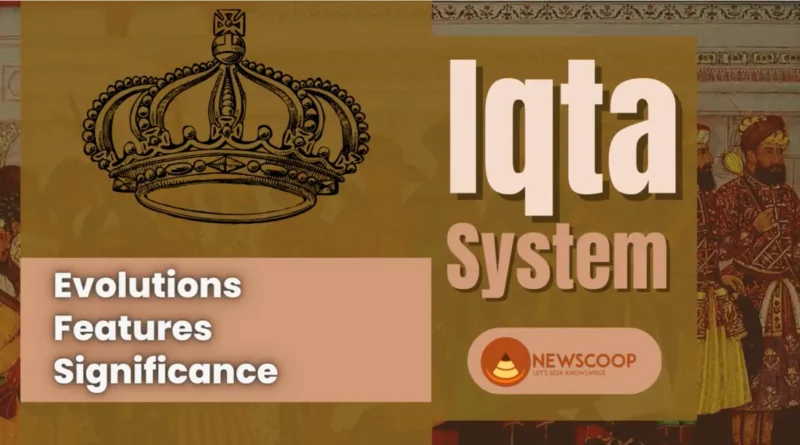Iqta System: Meaning & Features | Iqtadar
Initially, the Iqta System was an Arabic practice adopted by Turks. But, After the establishment of Turkish rule in India, this System was introduced in India as well. After reading this article, you will get answers to all the questions in your mind.
In this article, you will get to know everything about the Iqta System, uncovering its significance and intricacies. We will explore the meaning of “iqtadar” and “iqta,” investigate the historical figures responsible for introducing the Iqta System, elucidate its key features, and shed light on the role and identity of those known as iqtadars.
| System | Iqta System |
| Iqta | Piece of Land |
| Iqta was given to | Military Commander |
| Head of Small Iqta | Iqtadar |
| Head of Large Iqta | Mukta |
| Role | political, administrative, and military purposes |
| Appointment | Merit-based |
| Introduced by | Iltutmish |
What is the Iqta System?
Iqta refers to a piece of land that was given to a military commander for political, administrative, and military purposes. Further, it was based on the promise or belief that the success of the military campaign of the Sultan reflected the joint efforts. Moreover, whatever gains are received in military success, the Sultan should share them with his military commander.
Iqta System in India
Mohammad Ghori was the first to start the Iqta system in India but it evolved during the different sultans of India. Iqta was divided into two parts:
- Small Iqta (Head of small Iqta was referred to as Iqtadar)
- Large Iqta (Head of large Iqta was referred to as Mukta or Wali)
The status of Mukta or Wali was much higher as compared to Iqtadar.
Essential features of the Iqta System
- Iqtadar is used to perform a number of functions for the state. So it was expected that they should handle political, administrative, and military mechanisms.
- It was represented as the provincial along with the Sub-Provincial administration.
- This System was Meritorious in nature, as only meritorious candidates were appointed as Iqtadar. Further, they were appointed on the basis of overall performance as commanders.
- Centralized in Nature: All the appointments are directed by the Sultan. So, Iktadar was directly accountable to the Sultan for the overall function.
- This system was based on the laws of Escheat. After the death of Iqtadar, the wealth accumulated after being appointed as Iqtadar was taken away.
- Further, characterized by the regular transfer of the Iqtadars so that they were not allowed to stay in one place for a long time.
- There were regular inspections of the troops so that the military could work efficiently.
Evolution of the Iqta System
- Iltutmish:
- Iltutmish was the first Sultan of the Delhi sultanate who reorganized the Iqta system and defined the duties and responsibilities of Iqtadars.
- They used to maintain the administration of their own.
- They used to collect revenue and meet expenditure with revenue and the rest will have to be deposited in the central treasury.
- They used to maintain a fixed number of troops to assist the sultan during the wars and battles.
- Sultan Balban:
- Sultan Balban emphasizes the high Central control.
- He used to transfer regularly from one place to another so that they cannot misuse their powers.
- Appointed Khwaja with every Iqtadar to ensure that the accounts were maintained properly.
- Alaudin Khiliji:
- More central control over the Iqtadars because they annexed most of the Iqtas of the Doab region.
- Revenue amount increased regularly to keep them under central pressure.
- Established a department named Diwan-i-Mustakhraj in order to collect the revenues.
- Mohammed Bin Tughlaq:
- Amroha Experiment: Mohammad Bin Tughlaq ordered Iqtadars to deposit the entire revenue to the state.
- They were given a salary along with some expenditure in order to perform administrative functions.
- Firoz Shah Tughlaq:
- Sultan Firoz Shah Tughlaq made the Iqta system hereditary. So, after his death, his son/son-in-law/slave/widow would make Iqtadar.
- Conducted a Revenue Survey to reduce the burden of revenue under the leadership of Khwaza-Nizamuddin.
- Feroz Shah also stopped receiving the Peshkash or ceremonial gifts to reduce the burden.
- Lodhi:
- Iqtadars were allowed to retain the entire revenue on the basis of the Afghan theory of Kingship.
Significance & Contribution
The Iqta System played an important role in the success of Turko-Afghan rule in India.
- It provided a political, and administrative mechanism for the sultan to manage new territories.
- The Sultan was not required to worry about the means of administration.
- The Iqta System enabled a sultan to maintain a large army without much difficulty.
- Strengthening the economic foundation of the Sultanate.
- Only meritorious candidates were appointed, which motivated the shoulders and commanders to become Iqtadar.
- Strengthening of centralized control as all were accountable to the Sultane.
- Help in carrying out territorial expansion as Iqtadars were supposed to maintain military campaigns in their areas.
- Help in the consolidation of the Delhi Sultanate because Iqtadars were responsible for suppressing the revolts and rebellions in their territories along with neighboring areas.
- Allow the sultan to keep the capital free from the conspiracy of powerful nobles.
Limitations
- Cause of recurring revolts and rebellions.
- Iqtadar used to declare his independence whenever any weak ruler sat on the throne of the Delhi Sultanate.
- The fragmentation of authority between the sultan and Iqtadar and caused trouble repeatedly.
- When Feroz Shah Tughlaq made it hereditary, it became a destructive institution that impacted the strength and effectiveness of the central authority.
- Under Lodhis, the entire revenue was allotted to Iqtadar due to which nobles started equating them with the Sultan. Further, the Iqtadars were not dependent on the Sultan for anything and challenged the authority.
So, this is all about the Iqta System. If you like this article, please share it with your friends.
Thank You!
What is the Iqta System?
The Iqta System was a medieval Islamic land-grant system where rulers granted parcels of land (iqta) to military commanders and officials in exchange for services like military and administrative duties.
What is the meaning of Iqta?
“Iqta” means a land or territory granted by a ruler to an individual in exchange for services like military or administrative duties in the context of the medieval Islamic Iqta System.
What is the meaning of Iqtadar?
“Iqtadar” refers to an individual who was granted a piece of land or territory known as an “Iqta” by a ruling authority, typically a sultan or monarch, in exchange for various services, such as military, administrative, or fiscal duties.

